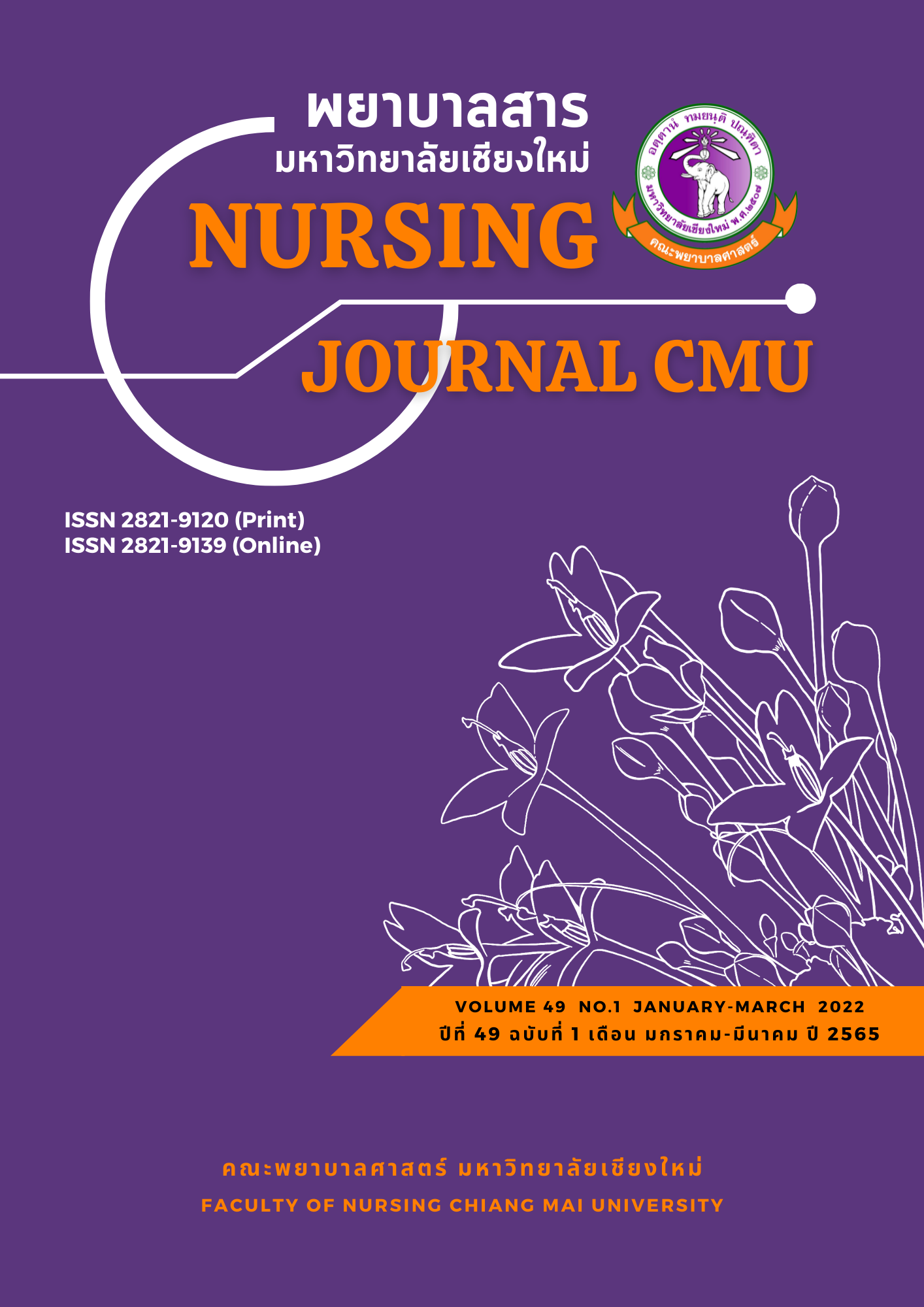Health Literacy and Behaviors to Prevent COVID-19 Among Older Persons at Risk for Dementia in a Rural Community in Chiang Rai Province
Keywords:
Health literacy, Health behaviors prevention of COVID-19, Older persons at risk for dementiaAbstract
Thailand is experiencing a pandemic of COVID-19 which is spread via viral droplets through inhalation or direct contact. Older persons at risk for dementia may have more severe symptoms than persons of other ages when infected with COVID-19. The purpose of this descriptive correlational study was to investigate health literacy, ิbehaviors to prevent COVID-19, and the relationship between health literacy and behaviors to prevent COVID-19 among older persons at risk for dementia. The purposive sampling method was used to select 95 older persons at risk for dementia. The data collection instruments were composed of an interview form on health literacy and behaviors to prevent COVID-19, which were tested for validity and reliability. Descriptive statistics and Pearson’s product moment correlation coefficient were used for data analysis.
The results of the study revealed that:
1. Overall health literacy and that of each dimension among older persons were at a moderate level and behaviors to prevent COVID-19 were at a high level (x ̅ = 66.49, SD = 4.75)
2. Health literacy had a statistically significant positive correlation to behaviors to prevent COVID-19 at a moderate level (r = .344, p < .001).
3. There were a statistically significant positive correlation between each dimension of health literacy and behaviors to prevent COVID-19 at a moderate level, including transmission information relevant to health prevention (r= .377, p < .001), changing health behaviors (r =.343, p < .001), and accessibility of information and health services (r =.323, p < .001).
4. There was a statistically significant positive correlation between each dimension of health literacy and behaviors to prevent COVID-19 at a low level, including understanding of adequate health information and services (r = .294, p < .01), health decision-making (r = .280, p < .01), and knowledge exchange interaction (r = .202, p < .05).
The results of this study can be applied as baseline information for enhancing health personnel in planning activities to promote behaviors to prevent COVID-19 among older persons at risk for dementia.
References
Alzheimer’s Association. (2021). Mild cognitive impairment (MCI). Retrived from https://www.alz.org/alzheimers-dementia/what-is-dementia/related_conditions/mild- cognitive-impairment
Burns, N., Grove, K. S. (2009). The practice of nursing research: Appraisal, Synthesis and Generation of evidence (6th ed.). Philadelphia: Elsevier.
Chiang Rai Provincial Public Health Office. (2022). Situation report corona virus disease (COVID-19) in Chiang Rai. (in Thai) Retrived from http:/cro.moph.go.th/moph/ index.php.
Department of Disease Control, Ministry of Public Health. (2021). Information for protecting yourself from Covid-19. (in Thai) Retrived from https://ddc.moph.go.th/ viralpneumonia /file/introduction/introduction01.pdf
Department of Disease Control, Ministry of Public Health. (2022). Situation report corona virus disease (COVID-19) in Thailand.(in Thai) Retrived from https://ddc.moph.go.th/viralpneumonia/index.php
Eliopoulos, C. (2018). Gerontological nursing (8th ed.). Philadelphia: Lippincott Williums & Wilkins.
Glomjai, T., Kaewjiboon, J., & Chachvarat, T. (2020). Knowledge and behavior of people regarding self-care prevention from novel coronavirus 2019 (COVID-19). Nursing Public Health and Education Journal, 21(2): 22-29. (in Thai)
Grove, K. S, Burns, N., & Gray, R. J. (2013). The practice of nursing research: Appraisal, synthesis and generation of evidence (7th ed.). Philadelphia: Elsevier.
Hoa, V. H, Giang, T. H., Vu, T. P., Tuyen, V. D., & Khue, M. P. (2020). Factors associated with health literacy among the elderly people in vietnam. Hindawi BioMed Research International, 2020(1), 1-7
Intarakamhang, U. (2018). Health awareness assessment report on disease prevention. (in Thai) Retrived from http://bsris.swu.ac.th/upload/283350.pdf
Kespichayawattana, J., Wiwatwanich, S., & Wanwaja, C. (2020). Health literacy of the elderly in elderly clubs/centers in Bangkok. Journal of Demography, 36(2), 37-52. (in Thai)
Khumthong, T., Potisiri, P., & Kaedumkoeng, K. (2016). Factors influencing health literacy forpeople at risk of diabete mellitus and hypertension of UthaiThani and Angthong. Veridian E-Journal,Science and Technology Silpakorn University, 3(6), 2408 - 1248. (in Thai)
Liu, B. Y., Chen, L. Y., Xue, P. H., Hou. P. (2019). Health literacy risk in older adults with and without mild cognitive impairment. Retrieved from https://www.nursingresearchonline.com
Manmana, S., Iamsirithaworn, S., & Uttayamakul, S. (2020). Coronavirus disease-19 (COVID-19).Journal of Bamrasnaradura Infectious Diseases Institute, 14(2), 124-33. (in Thai)
Nutbeam, D. (2000). Health literacy as a public health goal: A challenge for contemporary health education and communication strategies into the 21st century. Health Promotion International, 15(3), 259-267.
Nutbeam D. (2008). The evolving concept of health literacy. Social Science & Medicine. 67(12), 2072-78.
Olowe, A. O., Ross. J. A., (2017). Knowledge, adherence and control among patients with hypertension attending a peri-urban primary health care clinic, kwaZulu-natal. African Journal of Primary Health Care & Family Medicine, 9(1), e1–e7
Srisupak, R., Ngampriam, P., Loachai, S., Srisawangwong, P. (2021). The relationship between Health literacy and practice prevention from COVID-19 of elderly case study: Waeng Nang sub-district, Maha Sarakham Province. KKU Journal for Public Health Research. 14(3), 104-114. (in Thai)
Vorrapittayaporn, C., Malathum, P., & Phinitkhajorndech, N. (2021). Relationships among knowledge, health literacy, and health behavior in older persons with chronic kidney disease. Ramathibodi Nursing Journal, 27(1) , 81-95. (in Thai)
World Health Organization. (1998). Health promotion glossary. division of health promotion, education and communications, health education and health promotion unit. Geneva: Author.
World Health Organization. (2022). COVID-19 Weekly epidemiological update. Retrieved from https://www.who.int/publications/m/item/weekly-epidemiological-update-on-covid-19---6-january-2022
Yodmai, K., Pechrapa, K., Kittipichai, W., Charupoonpol, P., & Suksatan, W. (2021). Factors associated with good COVID-19 preventive behaviors among older adults in urban communities in Thailand.Journal of Primary Care & Community Health, 12(1), 1-9.
Downloads
Published
How to Cite
Issue
Section
License
Copyright (c) 2022 Nursing Journal

This work is licensed under a Creative Commons Attribution-NonCommercial-NoDerivatives 4.0 International License.
บทความที่ได้รับการตีพิมพ์เป็นลิขสิทธิ์ของวารสารพยาบาลสาร
ข้อความที่ปรากฏในบทความแต่ละเรื่องในวารสารวิชาการเล่มนี้เป็นความคิดเห็นส่วนตัวของผู้เขียนแต่ละท่านไม่เกี่ยวข้องกับมหาวิทยาลัยเชียงใหม่ และคณาจารย์ท่านอื่นๆในมหาวิทยาลัยฯ แต่อย่างใด ความรับผิดชอบองค์ประกอบทั้งหมดของบทความแต่ละเรื่องเป็นของผู้เขียนแต่ละท่าน หากมีความผิดพลาดใด ๆ ผู้เขียนแต่ละท่านจะรับผิดชอบบทความของตนเองแต่ผู้เดียว






